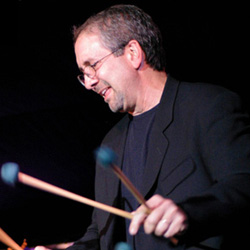This article is the second part in a series on using new technology to succeed in the music business. For part one click here.
This interview was recorded by Steve Gordon for his Internet radio show.
Steve Gordon: Dave Samuels is one of the foremost vibraphone and marimba players in the world.
He’s worked with a long list of some of the most brilliant jazz and fusion artists, including Spyro Gyra, Pat Metheny, Gerry Mulligan, Oscar Peterson, and Chet Baker.
Other experiences included working with the group Timepiece with Frank Zappa.
Currently he plays in an ensemble called the Caribbean Jazz Project, a Grammy-winning jazz-Latin music group. Dave, thanks for joining us on the show.
Dave Samuels: Thank you, Steve, it’s a pleasure to be here.
SG: When did you start playing music?
DS: I started playing music when I was about six years old. I started out playing drums; in high school I started playing a little piano.
Kind of where drums and piano intersect is where you find marimba.
SG: That was my next question: not that many people take it up. How did you get involved in the vibes and the marimba?
DS: I had a friend who was a piano player. I used to play drums in his group. He wanted to put together a chamber jazz ensemble of piano, vibes, bass, and voice. I was kind of in the mindset for a change, not in terms of not being involved in music, but just finding a new direction.
So, this was an opportunity to explore something different. Not only was this exploration for me, but discovery in that I found a whole new voice.
SG: I understand you teach at Berklee College of Music in Boston. As a matter of fact, I’ll be teaching at The New School’s Jazz and Contemporary Music Program this fall. Do you think it’s a good idea for a jazz musician to get formal training at a place like Berklee or The New School?
DS: The situation has changed drastically. When I was in college, there really weren’t any opportunities in terms of being able to go to a regular university and go into the music program and study jazz.
My options were I either study classical percussion so I could get some future job in an orchestra or not go at all. I chose not to go that route because of the fact that that wasn’t where my interests were, and learned how to play in more of a traditional way, which was before there were school programs.
People, for hundreds of years, musicians and artisans in general, apprenticed with people and it wasn’t really a formal, organized education;it was an apprenticeship.
SG: Some great musicians coming out of Berklee
DS: It’s changed drastically. There are really great programs in a lot of schools. Berklee is certainly at the top of the list in terms of not only learning how to improvise, and coming from that kind of a tradition, but it is kind of like a musical ecosystem.
There is everything that applies to music available there; everything from the obvious, which is learning how to play an instrument, to music production, to music therapy, to music business, to music education. It’s really an incredibly broad scope.















